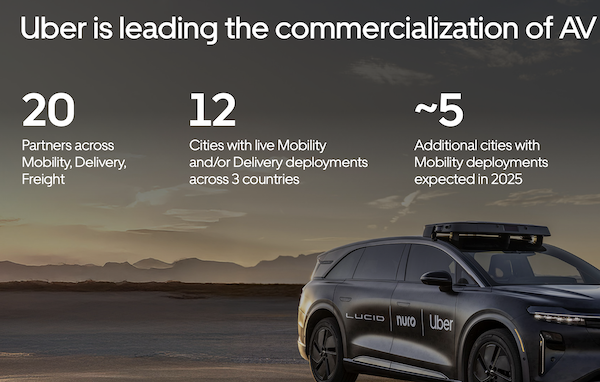Sign up for our free daily newsletter
Get the latest news and some fun stuff
in your inbox every day
Get the latest news and some fun stuff
in your inbox every day
Uber recently released a good set of trading numbers. For the quarter, revenue was $12.7 billion (up 18%), translating into net profit of $1.3 billion (up 33%). Perhaps more impressive is the 44% increase in free cash flow, which enabled the company to announce a $20 billion share buyback program, roughly 10% of its market capitalisation.
Looking forward a few years, the future of mobility is in self-driving vehicles. We are heading to a place where ride-hailing will be so cheap that most people won't have their own cars. Uber estimates that ride-hailing could grow by 25x if prices drop to under $1/mile. The only way to do that is to remove expensive human drivers.
Under former CEO Travis Kalanick, Uber had its own self-driving research unit, but it was shut down due to massive R&D costs and a death during testing. Now, with improved self-driving technology, Uber has partnered with a number of different companies in many different cities. It appears that their plan is to test a variety of approaches to determine what works best.
Consumer fear of having a robot drive them around town has disappeared too. In San Francisco, Waymo's self-driving cars now have a bigger market share than rival Lyft. Waymo (owned by Google) is about 25% more expensive than Lyft, indicating that customers are willing to pay extra to avoid having a human driver.
Tesla is another big player in this emerging industry. Tesla's self-driving cars only have cameras for analysing their environments. This is significantly cheaper than many competitors who use cameras and lidar, so Tesla's cost per mile is lower than everyone else, which could give them a big chunk of the market in the future. Tesla bulls will argue that the AI behind their cars is superior, so there is no need for lidar. Regulators might take a different view.
This industry is still very young and in a testing phase. Once the technology settles, and regulators have given the thumbs up, companies will adapt. Uber is well-positioned for any changes, given that they have a broad network of different service providers. They also have a valuable brand, and their app is already installed on a couple hundred million phones.
Uber is a "future hero" stock given how huge the self-driving market could be in the next decade. It currently trades on a P/E of only 15, so it's extremely cheap for a tech company. We have 34 clients who already own Uber, and it may be one to consider in your portfolio.
